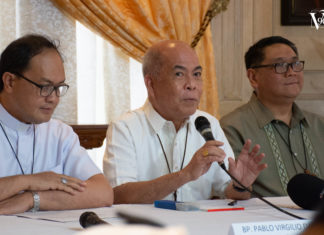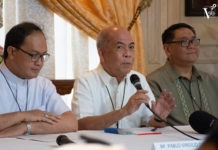AS SOMEONE who brags about his machismo and iron-fisted ways, President Duterte is ironically afraid of being criticized by the media that even with the slightest hint of a bad press, he and his allies would straightaway attack and threaten journalists.
Since his election in 2016, Duterte has been cursing and publicly humiliating journalists and editors that have questioned his bloody war on drugs campaign. At one time, he gave catcalls to a female journalist during a press conference and in another, claimed without evidence that media killings were caused by press extortion. He even appointed Esther Margaux “Mocha” Uson, a peddler of fake news, as assistant secretary of his communications office.
Like a true authoritarian, he could not tolerate critical coverage of his administration.
As a result he has made the country more dangerous for journalists. Duterte’s blatant hatred of and hostility toward media organizations are recorded in the 2018 World Press Freedom Index released by media watchdog Reporters Without Borders last May.
The president and his allies “openly encouraged” the strong hostility towards members of the media, the organization said in a statement.
The brutal killing of radio broadcaster Joey Llana last July 20 is the 10th recorded killing of a journalist under Duterte’s term. He was shot five times by unidentified gunmen while he was pulling out of his garage in Daraga, Albay. His brother said Llana had texted him a week before saying he had been receiving death threats, “but just took (them) lightly.”
As of May 2018, the Center for Media Freedom and Responsibility has recorded 11 reported death threats and 14 filed online harassments. There were also six slay attempts and six cases of harassment.
Note that these numbers only mirror filed cases. There are still many journalists who face intimidation through personal and online tirades of Duterte’s blind allies.
During my stay in the Varsitarian, I witnessed how our bold editorials and stern criticisms of the government often received uncivil—and dangerous—comments from readers, mostly on social media.
Even I, who represented the publication’s stand on several issues, have received private offensive messages online.
These kinds of intimidation cannot stop us. In fact, it would take long for the media to succumb to these oppressive attacks. We learned to remain faithful in the responsibility of our jobs a long time ago.
When the country was placed under martial law in 1972 by the dictator Ferdinand Marcos Sr., several media organizations were shut down and journalists were unlawfully arrested. There was a general order released by Marcos to then defense secretary Juan Ponce Enrile and public information secretary Francisco “Kit” Tatad ordering them to “take over and control or cause the taking over and control” of newspapers, magazines, radio and television facilities and other means of media communication to stop the “propaganda purposes” against the government and its authorities which could “undermine the faith and confidence of the people in the government.”
In the words of journalist Primitivo Mijares, this led the country into a “deathly journalistic silence.”
We are not going to let that happen again, especially now when we know how powerful the voice of the media is. It’s the same voice the president himself even asked to “criticize with moderation” in a speech last January. It’s the same voice his allies try to silence, most especially when it speaks of human rights violations. It’s the same voice they try to control, as if it is our job to please them with what we write.
We cannot back down with this intimidation. It is high time to raise our voices and practice responsible journalism, to combat fake news and to remain with an objective point of view—not just neutral. They cannot strangle us anymore.
***
As my term in the Varsitarian ends, I extend my gratitude to the people who helped me throughout this challenging publication year:
To Sir Lito Zulueta, Sir Felipe Salvosa II and Sir Christian Esguerra, thank you for instilling in me the values of responsible journalism. Your counsel and directions helped me become the strong aspiring journalist I am today.
To my fellow editorial board members, Bernadette Pamintuan and Alhex Adrea Peralta, you made my stay in the Varsitarian more meaningful. I cannot picture myself surviving this year if it were not for your support and commitment.
To the section editors, I appreciate your dedication not only in the editorial process but also for the assurance that I have your support in facing the challenges of ‘V.’
To the rest of the staff, as one popular lyricist wrote, “I had the time of my life fighting dragons with you.” Thank you for making this year possible.
I close the last issue of the Varsitarian under my editorship with a strong heart fuelled by faith in good journalism and in my fellow Filipinos who raise their voices loud enough to make the leaders of the land listen to their citizens’ true situations.
















